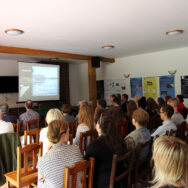
From 31 May to 3 June 2016, in Zatom near Drawno, the II Zooplakton Conference was held. It was entitled ‘The usefulness of zooplankton in water quality assessment’. The organizers of the conference were: the Zooplankton Section of the Polish Hydrobiological Society, the Branch of Polish Hydrobiological Society in Szczecin and the Faculty of Biology of the University of Szczecin.

The II Zooplankton Conference was attended by 40 participants from 13 research units, including foreign ones and other operating in the sector of environmental protection. Abstracts of papers and reports were published in the conference proceedings. The main idea of the conference was to assess the possibility of using zooplankton in water quality assessment. The conference topic was due to the need to include zooplankton, as a central element of biological assessment and to take calibration work in the future in order to achieve strong metrics as it was been done in case of phytoplankton, macrophytes, macroinvertebrates and fish.

In the context of LIFE DrawaPL, whose representative took part in the meeting, what is especially interesting is the possibility of using the knowledge about zooplankton as a quality indicator, for flow-through lakes assessment, and some elements of a channel where zooplankton may occur, such as oxbow lakes, mariginal lakes or lateral channels periodically cut.

During the conference 15 papers and 17 posters were presented; there were also workshops on determining copepods. In the first session, chaired by Dr. hab. Jolanta Ejsmont-Karabin, Prof. UB, the authors of papers clearly indicated good indication qualities of zooplanktonimg_3357, especially rotifers. The second session was led by Mrs. Dr. hab. Ewa Paturej, Prof. UWM.

This session started with a speech delivered by the president of our section about the macroecological approach to the world of rotifers. The third session conducted by Mrs. Dr. hab. Irena Bielańska-Grajner, Prof. UŚ, concerned flowing waters zooplankton. The official part of the conference finished with a poster session, which introduced the latest works of the participants, from the influence of nanoelements upon brine shrimp reproduction to securing food resources in a form of zooplankton for the larval stages of rheophilic fish. The last topic is directly linked with a research part of the LIFEDrawaPL project where an important question is about the potential for rearing juvenile stages of species which are to return to the basins subject to actions after removing barriers.

Another day passed under the slogan ‘Copepods Workshop’ conducted by Dr. hab. Maria Hołyńska. The workshop was mainly aimed at young hydrobiologists who, under the watchful eye of the leader, became familiar with some methods which enable easier and more efficient determining of certain species of copepods. After the workshop, educational rafting on the River Korytnica took place, where the participants put the gained knowledge in practice in the conditions of the river valley.

The meeting ended with a paper session led by Dr. hab. Natalia Kuczyńska-Kippen, Prof. UAM. The papers were about the impact of the lakes catchment areas on zooplankton structures. Also the results of research on zooplankton carried out in Ukraine were presented, in two anthropogenic water reservoirs, the first one pit, saline reservoir and the second Dniestrowski Tank.

The conference was summed up by the President of the Zooplankton Section Mrs. Dr hab. Jolanta Ejsmont-Karabin, Prof. UB. It was concluded that continuation of the meetings is an important element of the hydrobiologists activity.
The knowledge presented with practical applications of using zooplankton in water quality assessment in catchment areas, as well as in parts of river basins, where zooplankton is likely to occur, creates a significant increase in the possibility of practical use of this part of fauna in aquatic ecosystems in monitoring research.